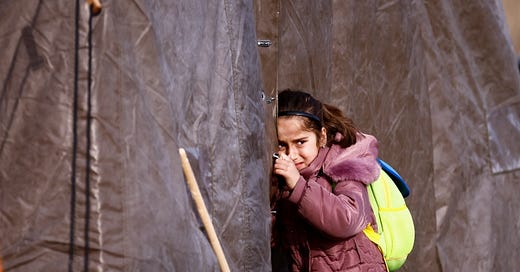Human Traffickers Targeting Refugees of Ukraine War
“It's really hard to distinguish and see who's sincere and who isn't”
As the war in Ukraine rages on, refugees are pouring over the border in Poland and other neighboring countries—and there are bad actors lying in wait.
Human trafficking is an under-discussed aspect of the crisis, but it’s a growing problem. In Poland, where over 850,000 Ukrainians have arrived so far, the chaos of such a massive crush of people heading to the border has meant there’s less protection for the vulnerable.
Journalist Carol Schaeffer told me during our conversation Monday about what she’s seen on the Poland-Ukraine border and why it’s been raising her suspicions.
“It's really hard to distinguish and see who's sincere and who isn't,” Schaeffer told me.
Thank you for your support. Please consider a paid annual subscription today.
No vetting process
A staff member from the human rights group International Justice Mission told The Independent that the situation on the Poland border, and the winter weather, is making things difficult. And while there are legit groups and people offering aid and comfort, there are also opportunistic traffickers lying in wait.
“Women and children wait for long hours to cross the border,” the staff member said. “If someone offers you a warm car you’re going to take it. You want your children to be warm.”
Schaeffer told me she’s heard varying levels of concern from people involved in caring for and helping refugees. On the one hand, the threat of trafficking is terrifying for women and children who have fled their homes for a new country with little more than what they’re carrying. On the other, one doesn’t want to create more fear than is warranted.
“Eastern European women—especially Ukrainian women—have long been victims of trafficking and of the sex trade, so that's definitely something to be aware of,” Schaeffer said. “I wouldn't say that there's any huge vetting process for the people that are coming and holding up signs. A lot of them seem really sincere but it's really impossible to tell.”

Domino effect
Volunteers in Germany have expressed frustration with an ad hoc approach to handling the influx of refugees that they fear will lead to more predation from traffickers. “It would be better if those who take in a Ukrainian woman or family had to register, unfortunately, some people here also try to exploit others," volunteer Monika Cissek-Evans told DW. “And it's not just men who approach refugees either, women shouldn't be blindly trusted either.”
Germany is the main stop for sex trafficking in Europe, and Berlin is the trade’s nerve center. That means that the risk is high for vulnerable refugees. And with over one million people streaming west from the war, it’s hard to keep tabs on who can be trusted and who can’t.
Berlin police issued a warning on Thursday to incoming asylum seekers to use caution when approached by men offering rides and accommodation.
“We currently have a huge number of people who want to help with honest intentions and, on the other hand, people who want to use this situation for their own purposes,” a police spokesman said.
The danger for refugees from traffickers is only just beginning. It’s likely we won’t know the full extent of the impact of the displacement for years.
Humanitarian organization CARE has been monitoring the situation with growing unease, the group’s human trafficking policy expert Lauren Agnew told MailOnline.
“It will have a vulnerable domino effect across Europe and refugees are at an increasingly high risk of exploitation,” Agnew said. “It is certain that as time goes on we will see a spike in numbers caused by refugees being exploited by traffickers and ending up potentially as sex workers, involved in criminal gangs or forced labour and domestic slavery.”
More on the crisis
Carol has an article out today at The Nation on another aspect of the refugee crisis—how it’s affecting people from Africa fleeing the war.
The past seven years have been particularly difficult for people of color in Poland. The right-wing populist Law and Justice party came to power on an anti-immigration platform. Anti-immigrant rhetoric has led to spikes in violence against people of color in Poland, and the national Independence Day march on November 11 of every year has become a gathering point for international far-right groups who march through Warsaw chanting, “White Poland, white Europe.” On March 1, a video circulated online that alleged that Black refugees from Ukraine were being chased and harassed by a far-right “civic patrol” in the border town of Przemsyl. While Omoshoto believes in the kindness of the majority of Polish people, he wants to protect refugees of color who are coming into Poland without support.
Jack Crosbie writes his last dispatch from Ukraine for Rolling Stone after leaving the country earlier this week.
It seemed like every person I met along the way was in one of the stages of grief. Over dinner, I watched a woman maybe a decade younger than me eat a full meal while staring into space, her eyes shocked and blank. After I ate, I sat down at a table with a group of young employees of a Kharkiv-based digital design firm called Zajno. They had spent four days huddled in their office basement and the local metro before piling 11 people, one dog, and six cats into a couple of cars and fleeing the city under fire. “Every night I see the war,” Sofy, an artist, said. “I don’t want to sleep. I see it in my dreams.” She laughed a little as she said this, probably knowing that it was a cliché. But it is also true. I have dreamed of cluster bombs while in beds in Uman and Lviv and places in between.
If you would like to support my work, please consider a paid subscription
Find me on Twitter and Facebook
Email me at eoinhiggins@gmail.com




